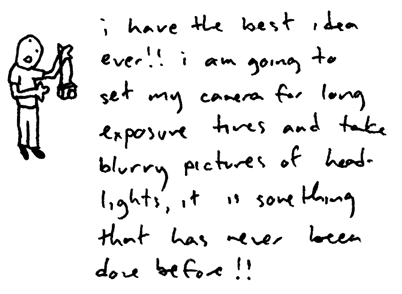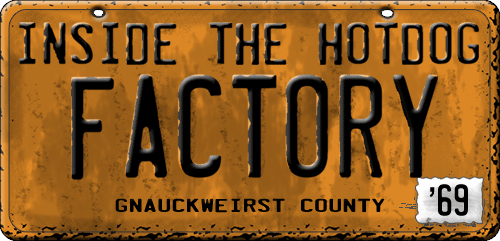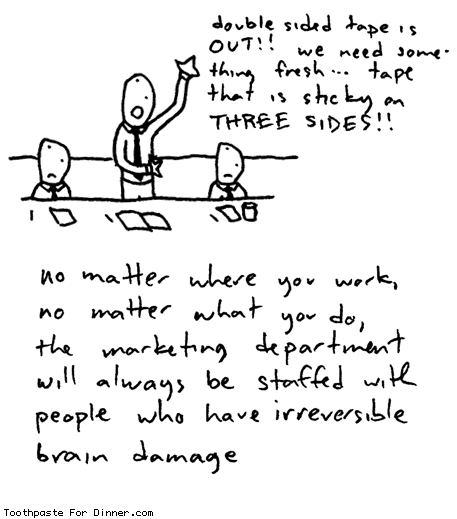
Last summer I joined a film group organized by wedding videographer who sought to branch out into making feature length movies. Although the brainstorming sessions grew copious and tedious, after a number of weeks the group (about a dozen regulars with a few scattered curious joining on various occasions) came up with a premise for its first film: a family driving in a car on their way to a funeral. As a practicing writer for the past fifteen years, and a publishing writer for the past seven years, this is the type of premise I would never conceive of touching. Years of reading and scribbling away at my work has served to Scotch-Guard my mind against cliches. Not that they don't still occur to me from time to time, but that there is nothing in me to give them purchase. They surface, quiver painfully in my imagination for a few moments, and then blow away like pollen. The film groups' premise couldn't have been more pedestrian, boring, lacklustre, inane, or trance-inducing if a team of malevolent philosophers set to the task of creating just that: The Worst Idea Ever.
As the brainstorming sessions teetered toward the inevitable, I saw it was time to excuse myself from the group. I was happy for everyone who was satisfied by the progress, but I, for one, have gotten to the point where I cannot be a part of projects that are not credible. I'm not nine years old anymore trying to draw an animated cartoon with my friends using highlighters and crayons. So, I bowed out quietly.
However, the contrarian in me -- the inverterate burlesque-monger and satirist in me -- could not simply walk away from The Worst Idea Ever. As a writer, I've only ever worked with my own ideas and my curiosity was pricked by the morbid challenge of working on this idea that not only originated outside of myself, but yielded so little promise. So, I had a go at it drafting an initial 20 pages of script. But the inner kamikaze who sometimes guides my steps wasn't satisfied with my toying with The Worst Idea Ever. No, it prodded me to collaborate with a friend and once-fellow group member. This person wasn't a writer, but that didn't matter. All a person needs are ideas. But this person had only one idea about our inaugural collaborative session: he would lead the writing of the screenplay (with me as typist). There was much to admire about his drive and willingness to "step up to the plate," but there was unmissable, inherent folly in the idea, as well. Thirty seconds into hearing his ideas on how to conduct our collaboration I saw that he would unintentionally have us tread the selfsame minefields I had spent a decade and a half learning to avoid. Questioning the basis for his creative outlook only inflamed him. The situation was so obvious it almost defied analogy -- but here's one: you have two guys, one is an auto mechanic, the other knows nothing about cars. Who are you gonna trust to work on your car?
So, the collaboration was stillborn and so seemed my 20 pages of script in which emerged five characters: father, Gerhard Schwanghammer, who went by "Gerry," his wife Grace, their daughter Abigail, son Andy, and the deceased grandfather. Gerry worked a low-level job at a radio station, Grace was a piano teacher, Abigail a disaffected teenager, and Andy a quirky, annoying kid with a fetish for stand-up comedy, and deceased grandfather who popped up in the car with wry memories and observations about the volatile family.
After some back-and-forth email with the leader of the film group, I commenced to see where Grandpa, Gerhard, Grace, Abigail and Andy took me. I titled the script
Mr. Brightside.
It took me six days to write the initial 86 pages. After meeting with the film group leader, who said everyone was excited by the excerpts I had sent to them. At the group's request, I took another few days and brought the page-count up to 112 pages. I submitted the script to the film group leader, received his "Thank you for the gift of this script" email, and was dropped from his consciousness like a facialized whore in a darkened alley.
Yes, I left the group. Yes, I didn't seek to be a part of the production. All my choices. But that script was the work of my hand. Yes, I would be credited as the writer, but somehow not consulted when the need for changes arose. Just from a common sense perspective wouldn't it be the best route having the person who
created the script make the needed alterations? Especially when no one else in the group could even come up with a script of their own? Not in this case, it seemed, where the tinkering commenced almost immediately.
Nor did I have the wherewithal to countenance the farce that was the "audition" process. Oh, I heard all about the pantomime of a search for the right "Gerhard," but in the end the leader of the group (now director) deigned to cast the group member who (in my experience) displayed the least amount of concentration, seriousness, or commitment of the entire group in the lead, as Gerhard Schwanghammer. This person was, coincidentally, a friend of the director's.
The immediate problem with that choice was that the script was dialogue-heavy. The lead roles demanded actors with professional experience. Unfortunately, the only two professional actors in the film group were relegated to menial, off-camera duties (though one eventually shone in a bit part). In fact, when one of these professional actors did audition, the director amazingly ran out of film just before it and thus was unable to show that audition to the rest of the group. Didn't matter because the auditions consisted of "cold reads" anyhow, and the professional actor (as anyone would) was described as "not connecting with the character." Hearing of the catastrophic casting blunder -- giving the "class clown" the lead role -- I wrote the director expressing my frank misgivings about his choice. Accusations were made regarding on whose behalf I was actually voicing my opposition. But my point of view was simple: creative projects like making a feature length film are fraught with difficulties. Why unnecessarily hobble yourself before getting out of the gate?
But there was to be much more hobbling to come.
First, the group didn't understand the genre of the script they received. The script was a drama with flashes of humor throughout. The group misinterpreted this and believed the script was a comedy. That's like being at the wheel of a vehicle you believe is an automobile, when in fact it's an air plane. There are some fundamental differences at play that
must be understood.
Then the changes came (changes are inevitable, of course; my complaint is with the hackneyed, ham-handed, arbitrary way in which these were made -- never with any consideration about what the changes did to the overall story).
Gerry goes by "Gerry" through most of the film, except when his wife, Grace, is angry with him, and snaps,
"Gerhard!" It's not very funny insolated like this here. Read the script, you'll see how it adds texture to the characters. The director trashed this. No one in the group understood the use of the two names.
Tedious flashback scenes were added to the film involving the deceased grandfather. And characters were added. For instance in the middle of the movie, while at a hotel, daughter Abigail goes down the hall to the soda machine. There, she is accosted by a wan, failed Mormon. Someone in the film group raised the question, "Don't Mormons go around in pairs?" This may be true, I don't even know, but rather than accepting that possibly this failed,
lone Mormon -- banished to missionary work in this lost burg -- is so hopeless as to be sent into the world with no partner, the director simply
added another Mormon. This changes the dynamic of the scene entirely: You have a lone teenaged girl now confronted by
two men at the end of this empty hallway. Humor turns into menace. A complete wrong turn.
Better yet was the addition of a transvestite to the diner scene in which the family is eating breakfast. Why not go for the cheapest, least substantial laughs imaginable? The director, in a fit of creative gusto and ecstacy, decided that the breakfast scene absolutely
demanded a campy transvestite enter the restaurant to give the film that nanosecond of mirth as the entire place turn and look in surprise.
How do I know of these things, and more, having excused myself from the group before production commenced? I know. If the group met at the bottom of a missile silo, I'd know what was happening with my work.
Unfortunately for the production, the girl playing Abigail quit the project entirely. I feel for the cast and crew because this loss effectively destroys the second half of the film. I don't know as yet if any firm solution has been arrived at to deal with this, but one idea I heard was bandied about involved the daughter simply disappearing with none of her family particularly concerned where she had gone. At the end of the movie Grace, the mother, would receive a cell phone call, smile, and announce that daughter Abigail is safe and sound -- somewhere.
To be fair, this production is the film group's first effort. It would be entirely unfair to expect perfection or even a sturdy level of competence from them (anyone) at this point. No zing intended on that. Especially with filmmaking where there are so many tangible, technical aspects to be mastered. When attending the meetings, it was my opinion that the group wouldn't produce anything of competence or consequence until -- at least -- its fifth or sixth project. I know about the learning processes involved with creative work. There is no way to rush it; no easy way around it. And I do admire the group's willingness to forge ahead in the face of setbacks.
One thing never changes with regard to creative projects -- they are created one decision at a time with each decision's impact having a knock-on effect throughout the entire work. Edits, revisions, alterations are inevitable in any work, but they should never been made simply so someone can leave their own fingerprints on a work. Also, I firmly believe in running with peoples' strengths. If you have a professional writer at your disposal, trust him with matters relating to the script. You have some professional actors, use them onscreen. I'm making short films with friends at present and this is our strategy, and it's working out great.
Ultimately, my feeling about this is "shame on me." I brought this (whatever "this" is) on myself. I should have known no matter whom I delivered my script to it would be treated like a drunken cheerleader at a fraternity keg party. It's just one of those laws or rules that greases the wheels of the universe.
 From CNN.com - Rehab, $30,000 to keep Limbaugh out of court: "Firebrand radio talk show host Rush Limbaugh was charged Friday with fraudulently concealing information to obtain prescription drugs, but prosecutors will drop the charge after 18 months if Limbaugh remains in treatment for drug addiction, his lawyer said."
From CNN.com - Rehab, $30,000 to keep Limbaugh out of court: "Firebrand radio talk show host Rush Limbaugh was charged Friday with fraudulently concealing information to obtain prescription drugs, but prosecutors will drop the charge after 18 months if Limbaugh remains in treatment for drug addiction, his lawyer said."


 I guess given the rarity and complexity of someone rising from the dead is what sets Easter celebrations on their ears. Even as a kid I had serious questions about the ambulatory bi-ped bunny silently shown in cartoons and television ads running around with eggs. No catchphrase like "Ho ho ho", "I Am Who Am", or even "Up yer ass!" or anything associated with this quiet, menacing image.
I guess given the rarity and complexity of someone rising from the dead is what sets Easter celebrations on their ears. Even as a kid I had serious questions about the ambulatory bi-ped bunny silently shown in cartoons and television ads running around with eggs. No catchphrase like "Ho ho ho", "I Am Who Am", or even "Up yer ass!" or anything associated with this quiet, menacing image.
 Don't misunderstand, Dominik Diamond began on the right track. Hosting a Channel 5 program titled Crucify Me was just the sort of arrogant genesis God could appreciate. It's just that sort of hollow bravado and misguided machismo that has caused God to bless George W. Bush's war in Iraq so heavily. And what spiritual journey has any validity if there is no camera crew recording it? Come on!
Don't misunderstand, Dominik Diamond began on the right track. Hosting a Channel 5 program titled Crucify Me was just the sort of arrogant genesis God could appreciate. It's just that sort of hollow bravado and misguided machismo that has caused God to bless George W. Bush's war in Iraq so heavily. And what spiritual journey has any validity if there is no camera crew recording it? Come on!
 Last summer I joined a film group organized by wedding videographer who sought to branch out into making feature length movies. Although the brainstorming sessions grew copious and tedious, after a number of weeks the group (about a dozen regulars with a few scattered curious joining on various occasions) came up with a premise for its first film: a family driving in a car on their way to a funeral. As a practicing writer for the past fifteen years, and a publishing writer for the past seven years, this is the type of premise I would never conceive of touching. Years of reading and scribbling away at my work has served to Scotch-Guard my mind against cliches. Not that they don't still occur to me from time to time, but that there is nothing in me to give them purchase. They surface, quiver painfully in my imagination for a few moments, and then blow away like pollen. The film groups' premise couldn't have been more pedestrian, boring, lacklustre, inane, or trance-inducing if a team of malevolent philosophers set to the task of creating just that: The Worst Idea Ever.
Last summer I joined a film group organized by wedding videographer who sought to branch out into making feature length movies. Although the brainstorming sessions grew copious and tedious, after a number of weeks the group (about a dozen regulars with a few scattered curious joining on various occasions) came up with a premise for its first film: a family driving in a car on their way to a funeral. As a practicing writer for the past fifteen years, and a publishing writer for the past seven years, this is the type of premise I would never conceive of touching. Years of reading and scribbling away at my work has served to Scotch-Guard my mind against cliches. Not that they don't still occur to me from time to time, but that there is nothing in me to give them purchase. They surface, quiver painfully in my imagination for a few moments, and then blow away like pollen. The film groups' premise couldn't have been more pedestrian, boring, lacklustre, inane, or trance-inducing if a team of malevolent philosophers set to the task of creating just that: The Worst Idea Ever.

